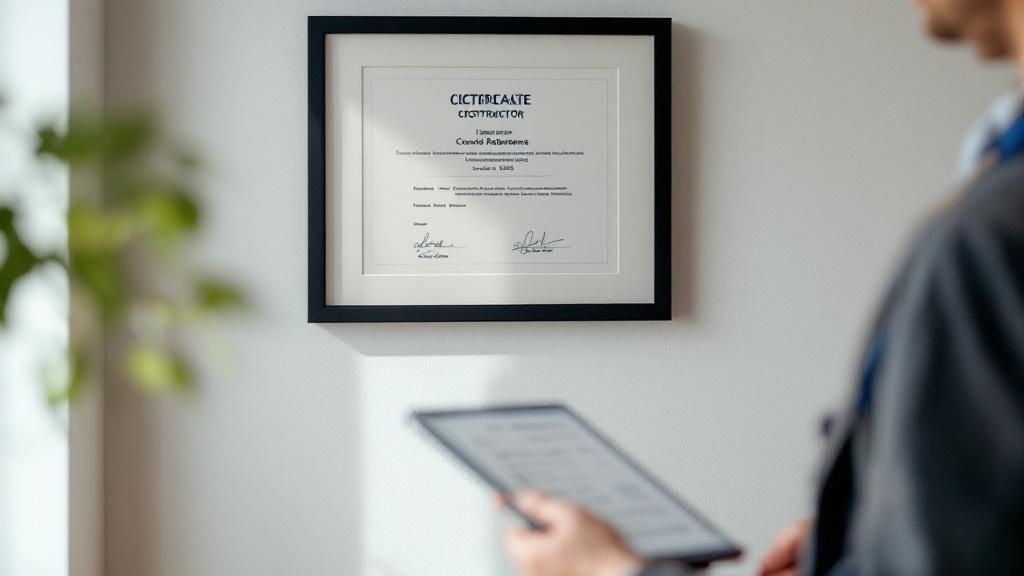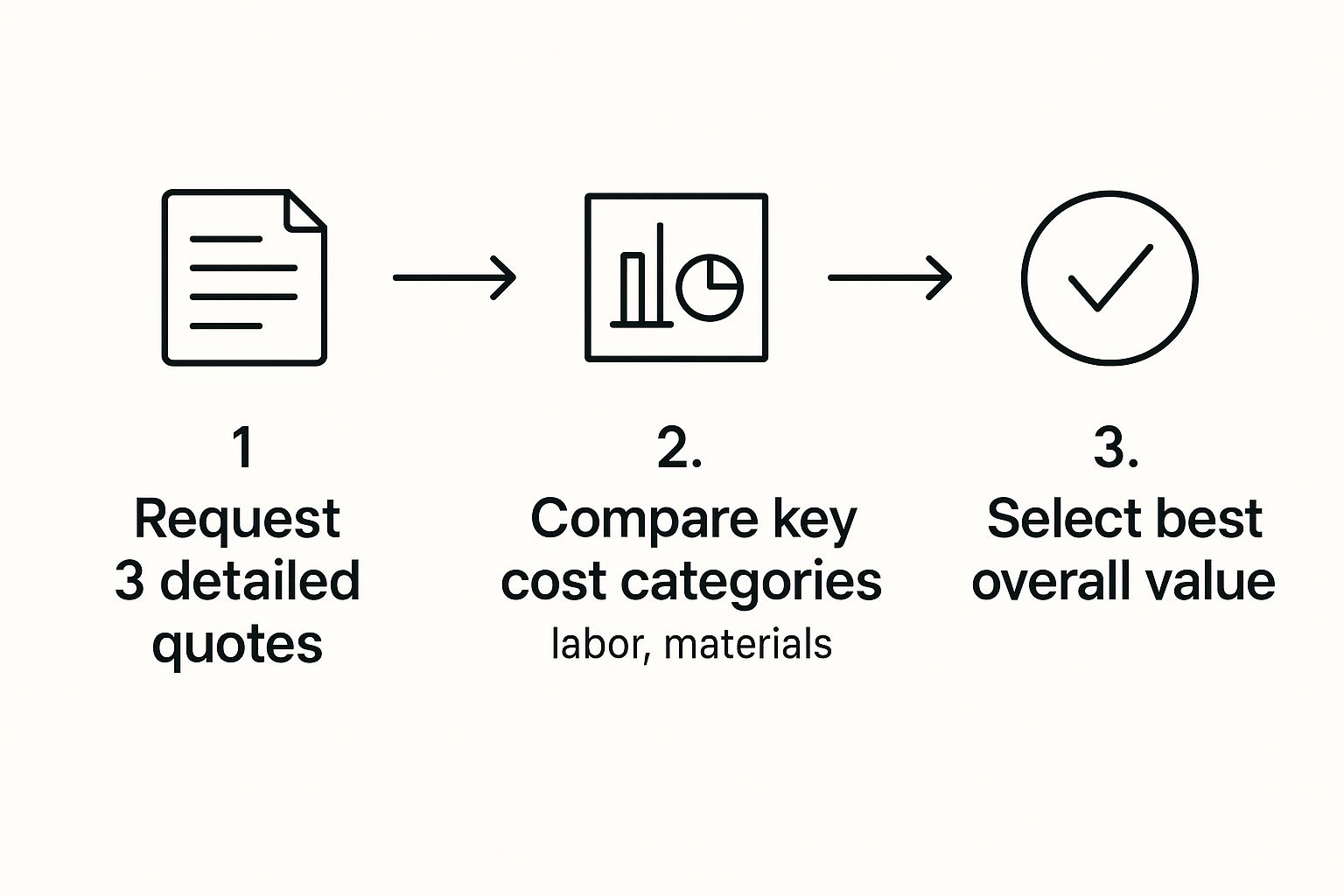Finding the right contractor starts with a few key steps. You must check licenses, verify insurance, and get trusted local referrals. Doing this homework first helps you build a solid list of qualified pros for your Bay Area project.
This initial work saves you time and headaches later on.
Starting Your Contractor Search In The Bay Area

In a busy market like the San Francisco Bay Area, finding a great contractor can be tough. The key is to have a clear plan. Focus on using reliable, local networks instead of just a simple online search.
Where To Find Reputable Contractors
Before you search online, use your local connections. This is the best way to get honest feedback from people with real experience.
Here’s where you should start your search:
- Ask Building Material Suppliers: The experts at local lumberyards, like the team at Truitt & White, work with contractors every day. They know who is reliable, who pays their bills on time, and who has a good reputation. Learn more about why Oakland contractors choose us for their projects.
- Talk to Neighbors and Friends: A referral from someone in your community is powerful. They can tell you about their experience with things like communication, cleanliness, and sticking to the budget.
- Consult with Architects or Designers: If you are working with a design professional, they will have a list of contractors they trust. This is often an excellent place to start finding qualified builders.
Perform Initial Vetting
Once you have a few names, it is time for a quick background check. This is a crucial step to remove any unqualified operators. It saves you from wasting time on phone calls.
Use this checklist to screen every potential contractor. Do this before you ask for a bid.
Essential Contractor Vetting Checklist
| Verification Step | What to Look For | Where to Check |
|---|---|---|
| License Verification | An "Active" license with no disciplinary actions. | California State License Board (CSLB) online portal. |
| General Liability Insurance | A current Certificate of Insurance (COI) with adequate coverage. | Ask the contractor for a copy to be sent from their insurer. |
| Workers' Compensation | Proof of active workers' comp insurance. | Ask for their policy details or check via the CSLB. |
Completing this checklist ensures you’re only considering serious, professional candidates. Don't skip it.
First, confirm their license is active with the California State License Board (CSLB). Next, you must get proof of both general liability insurance and workers' compensation. This protects you if an accident happens on your property.
Even for general projects, many of the same principles for choosing the right specialized company apply. It all comes down to checking their credentials.
Looking Over Their Past Work and Talking to References

You have narrowed your list to licensed and insured professionals. Now, you need to dig deeper to find a truly great contractor. This step separates the good from the best.
A portfolio shows a finished product, but it doesn't tell you about the process. Look for experience that matches your home's style, especially with the Craftsman or Victorian homes common in Berkeley and Oakland.
Don't just glance at the photos. Look for details that show pride in their work. Check for tight joinery, crisp paint lines, and quality finishes.
Getting the Real Story from Past Clients
Talking to a contractor’s past clients is the most important step. It helps you understand what it’s like to work with them day-to-day. A good contractor will gladly connect you with recent clients.
When you speak with references, ask specific questions. Don't just ask if they were happy.
Here are some good questions to ask:
- On Communication: How quickly did they respond to calls or emails? Did they keep you updated on progress?
- On the Budget: Did the final cost match the original quote? How were changes or unexpected costs handled?
- On Problem-Solving: Projects can have issues. How did the contractor solve problems when they came up?
- On the Schedule: Did the crew arrive on time? Was the project completed on schedule?
A contractor’s ability to manage a project effectively is just as important as the quality of their trade skills. Their communication style, professionalism, and problem-solving abilities directly impact the success and stress level of your renovation.
The answers will reveal how they perform under pressure. This helps you measure their commitment to customer service excellence for professional builders and homeowners. The goal is to find someone whose work style is a good fit for you.
Interviewing Contractors and Asking Key Questions

After shortlisting candidates, the interview is your chance to see how they work. It's a two-way conversation to check if their communication and personality are right for you.
This person will be a part of your life for weeks or months. You need a professional partner who understands your vision and can handle challenges.
Key Areas to Cover in Your Conversation
Having a few topics to discuss keeps the conversation focused. This ensures you cover all the important parts of how they manage projects.
Here are the essential topics to discuss:
- Project Management: Ask who your main point of contact will be. Knowing if it's the owner, a project manager, or a foreman sets clear expectations.
- Subcontractors and Crew: Find out about their team. A consistent crew of employees often provides better quality control than using different subcontractors for every job.
- The Permitting Process: Discuss their experience with local building departments in Berkeley, Oakland, or San Francisco. Each city has its own rules and processes.
- Material Sourcing: Ask where they buy their materials. A contractor with reliable local suppliers, like a lumberyard near Oakland, is less likely to face delays. Our guide to professional contractor supplies explains why quality sourcing matters.
Digging Deeper on Technical Expertise
This is also a good time to check their knowledge of modern building practices. A contractor who stays current with codes and green building technology is a great asset. This is especially true in the Bay Area, where rules are always changing.
Making Sense of Contractor Bids
Once you have formal proposals, the real analysis begins. It is tempting to pick the lowest number, but this can be a mistake. A cheap bid often signals cut corners or low-quality materials.
True value is in the details, not the final price. A professional bid should be an itemized document that breaks down every part of the job. It is a roadmap for your project and protects you from surprises.

This helps you focus on finding the best overall value. It's how you make a confident decision for your Bay Area home renovation.
What to Look For in Each Proposal
To compare bids fairly, you must look at each one closely. Vague descriptions or unrealistic allowances can lead to costly changes later.
Make sure each bid has a clear breakdown of these key areas:
- Labor Costs: Is the labor cost one lump sum or broken down by task? A detailed breakdown is more professional and transparent.
- Material Specifications: The bid should list exact brands for items like windows and doors, such as those from Marvin or Andersen. A generic line like "install new window" is not enough detail.
- Payment Schedule: Reputable contractors tie payments to project milestones, like a completed inspection. According to the California State License Board, down payments are limited to 10% or $1,000, whichever is less.
- Projected Timeline: The proposal must include estimated start and completion dates. This sets clear expectations for everyone.
The most reliable bids are detailed, specific, and leave very little room for interpretation. If one proposal is significantly less detailed than the others, it’s a warning sign that the contractor may be overlooking important aspects of the job.
The bid should specify high-quality products. For more on this, explore our guide on selecting contractor-durable materials that work well in the Bay Area climate.
Bid Comparison Breakdown
Laying out the key parts of each bid side-by-side can help you spot differences. This format makes it easier to see where the real value is.
| Bid Component | Contractor A | Contractor B | Contractor C |
|---|---|---|---|
| Total Price | $50,000 | $45,000 | $58,000 |
| Labor Detail | Lump sum | Itemized by task | Itemized by task |
| Materials | Generic allowance | Marvin Windows, TM Cobb Doors | Marvin Windows, Simpson Doors |
| Timeline | 8-10 weeks | 12 weeks | 10 weeks |
| Payment Terms | 50% down | 10% down, milestone payments | 10% down, milestone payments |
| Warranty | 1-year labor | 1-year labor | 2-year labor & materials |
In this table, Contractor B's low price looks good at first. But Contractor C offers a better warranty and higher-quality materials, providing more long-term value.
Finalizing the Contract to Protect Your Project
The contract is your project’s most important tool. It acts as the official roadmap for your renovation. It protects both you and the contractor by setting clear expectations.
A solid contract removes confusion and provides a legal plan for the project. Review it carefully before signing. Never hesitate to ask for clarification on any point you don't understand.
Key Elements of a Strong Contract
Every good construction contract should have several key parts. These details ensure everyone is on the same page.
Here’s what your contract must include:
- Detailed Scope of Work: This section must list all the work to be done. A vague phrase like "remodel kitchen" is not enough.
- Specific Materials and Brands: The contract must list the exact brands and models of all materials. This prevents substitutions without your written approval.
- Firm Dates: A clear start date and a projected completion date are necessary. This creates accountability.
- Payment Schedule: Payments should be tied to project milestones, not dates. For example, a payment is due after the framing passes inspection.
- Change Order Process: The contract should define how changes will be priced and approved in writing. This prevents disputes about extra costs.
Confirming your contractor has the right insurance is a huge part of protecting your investment. You can learn more about common general contractor insurance requirements to know what to look for.
Pro Tip: Your contract should also include clauses on dispute resolution and lien waivers. Lien waivers confirm that subcontractors and suppliers have been paid, protecting you from claims against your property.
Frequently Asked Questions About Choosing a Contractor
Homeowners and builders often have questions when starting a big project. Here are answers to some common questions we hear in the Bay Area.
How many bids should I get for my project?
You should aim to get at least three detailed bids for any large project. This helps you establish a fair price range. Comparing multiple proposals also makes it easier to spot unusually high or low bids.
What is the difference between an estimate and a bid?
An estimate is a rough guess of the potential cost. It's often given early in discussions to see if the project is within your budget. A bid is a formal, detailed proposal with a firm price based on a specific scope of work and materials.
What if a contractor asks for a big down payment?
This is a major red flag. California law limits down payments for home improvement projects to 10% of the total contract price or $1,000, whichever is less. Any contractor who asks for more is violating the law and is not trustworthy.
Why is hiring a local Bay Area contractor important?
A local contractor understands the unique building codes in cities like Berkeley and Oakland. They know the permitting process and have relationships with local suppliers and inspectors. This local knowledge is essential for keeping a project on schedule and ensuring it meets all requirements.
What are lien waivers and why do they matter?
A lien waiver is a document signed by a contractor or supplier confirming they have been paid. It prevents them from putting a lien on your property for that payment. Getting signed waivers at each payment milestone is crucial to protect your property from financial claims. The construction industry continues to face skilled labor shortages, which makes a contractor's local network and ability to manage their workforce more critical than ever, as noted in reports about global construction market trends on turnerandtownsend.com.
Have more questions? We've got more answers. Check out the full Truitt & White FAQ page for more insights.
Ready to connect with Bay Area contractors who trust the best? The team at Truitt & White can help you find the right materials and expertise for your next project. Visit our Berkeley showroom for expert advice.









